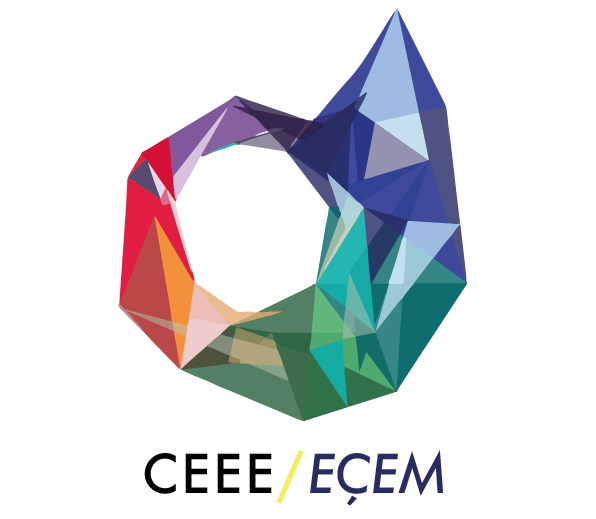Project Starting – Ending Dates: 01/02/2015 – 01/02/2018
Funded by: EU H2020 Programme
Project Budget: 2,000,032.50 € (EU Contribution: 2,000,032.50 €)
/ Özyeğin – CEEE budget: 217,500.00 € (EU Contribution: 217,500.00 € €)
Application Building: Academic Building 1, Özyeğin University, Istanbul
Project Team: M. Pınar Mengüç, Cem Keskin, Dilek Saygı
Project Partners: Turkey: CENTER FOR ENERGY, ENVIRONMENT AND ECONOMY (CEEE)
Spain: CIRCE, ACCIONA, ZARAGOZA VIVIENDA
Sweden: SWEDISH INTERACTIVE INSTITUTE
France: DELOITTE
Austuria: UNIVERSITY OF GRAZ
Other people and organizations who contributed to TRIBE Project: CEEE/CEEE (Cem Keskin, Dilek Saygı, Gülçin Mezireli)
Özyeğin University (Saadet Özcan, Serkan Şahin)
REENGEN
ORASS Automation
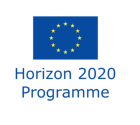

REASON
The EU-Horizon 2020-TRIBE project focuses on increasing the energy efficiency of public buildings by developing a mobile game. Therefore, behavior of occupants towards energy use can be displayed and modified. The TRIBE game was designed to be played in virtual buildings that are similar to the 5 pilot buildings selected within the scope of the project in terms of energy performance as well as their designs. The behavioral scientific background of the game is based on the goal of improving the reallife behavior of the players, who direct the energy use of avatars in buildings, through this interaction.
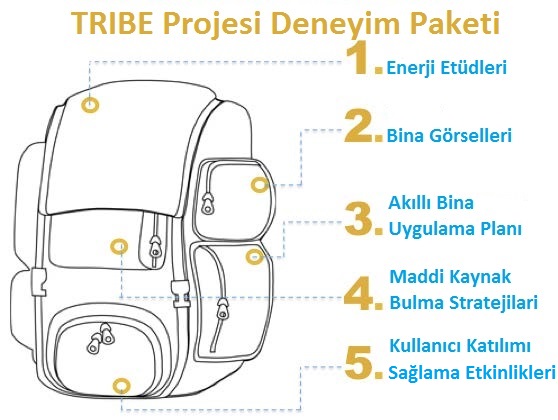
METHODOLOGIES
In this context, the TRIBE project team developed a scenario in which the gamers will try to correct the misuse habits of the residents (avatars) of the five animated buildings.
The interesting aspect of the project is that the energy profiles of the five buildings (office buildings, academic buildings and residences) in the game were cloned from real buildings, both socially and physically. Accordingly, the database of the game was fed with the outputs of sensor networks and energy simulations placed in 5 pilot buildings used by a total of 1300 fixed users and 12,000 visitors annually.
At the same time, through facetoface interviews and surveys with the building users during the design phase of the game, the energy usage habits of the building users were determined and loaded as the habits of the avatars in the game.
Thus, those who played the game had the chance to experience the effect of actions in virtual buildings on energy consumption or savings in a very realistic way by dealing with real building data physically and socially.
In this way, it was aimed that the gamers can internalize the consequences of the actions they repeat frequently in daily life regarding energy consumption.
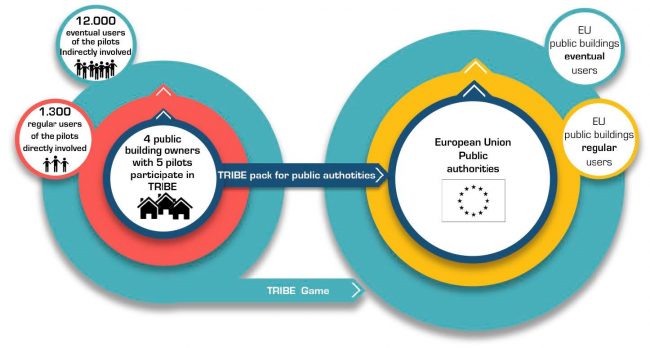
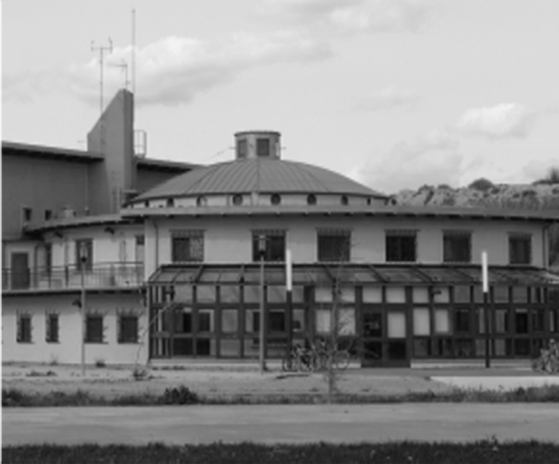
| CIRCE HQ Zaragoza, SPAIN |
| Construction Year: 2010 |
| Gross Construction Area: 1,743 m2 |
| Heating Source: Wind Turbine |
| Number of Users: 192 |
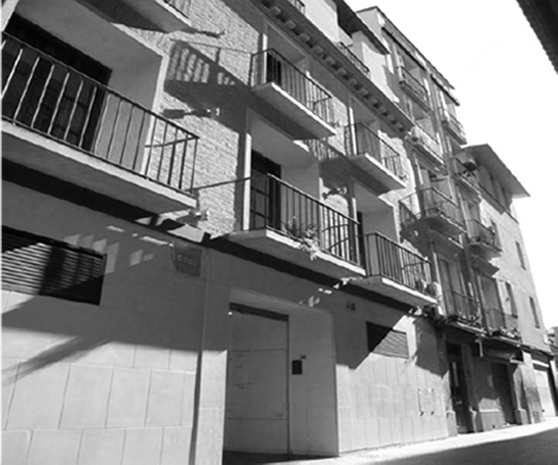
| SAN PABLO PUBLIC OFFICES Zaragoza,SPAIN |
| Construction Year: 2003 |
| Gross Construction Area: 1,000.9 m2 |
| Heating Source: Natural Gas |
| Number of Users: 38 |
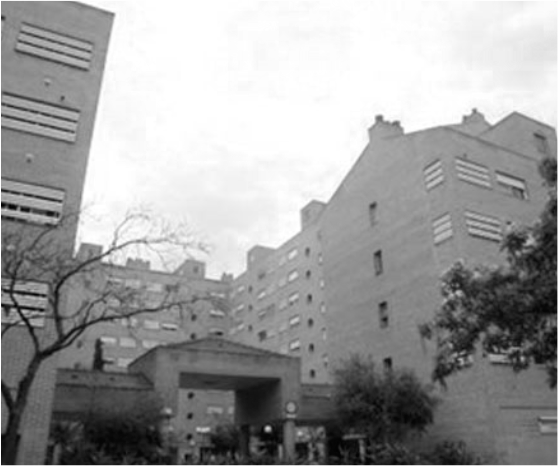
| EMMELINE DE PANKHURST Zaragoza,SPAIN |
| Construction Year: 1993 |
| Gross Construction Area: 1,400 m2 |
| Heating Source: Natural Gas |
| Number of Users: 48 |

| I.E.S. AZUCARERA Zaragoza, SPAIN |
| Construction Year: 2007 |
| Gross Construction Area: 6,599.64 m2 |
| Heating Source: Natural Gas + Electric + Renewable Energy |
| Number of Users: 800 students & 78 personnel |
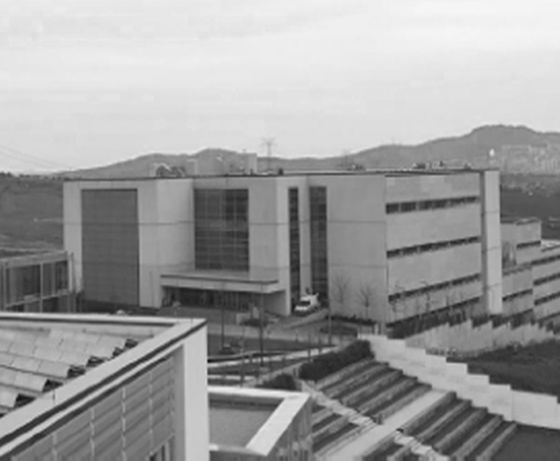
| ÖZYEĞIN UNIVERSITY Istanbul, TR |
| Construction Year: 2011 |
| Gross Construction Area: 26,000 m2 |
| Heating Source: Natural Gas + Electric + Renewable Energy |
| Number of Students: 8.450 |
IMPLEMENTATION
The most comprehensive sensor network within the TRIBE project was installed in the Özyeğin University Engineering Faculty Building (AB1), the largest among the pilot buildings. With more than 200 sensors placed within this scope, energy and comfort (temperature, humidity, CO2, door/ window) of 17 sample rooms with different usage profiles (classroom, office, study room and labo ratory) were monitored.
In addition, the total electricity and heat consumption use of the building were recorded in detail. In addition, an energy monitoring system developed within the scope of the project was installed in a high school buil ding, a municipal service building and two soci al housing buildings located in Zaragoza, Spain. This data from all these buildings were used to feed to the energy simulations of the buildings and the game database.
IMPACT
TRIBE Project was a 3year project with a total of 7 partners from Spain, Turkey, Austria, France and Sweden. During this period, promotional activities were primarily held in Turkey and Spain, where pilot buildings were located. Seminars were given by participating in relevant lectures at various universities in Turkey. In addition, efforts were made to reach the public through print media and social media.
The methodology and outputs of the project have been shared with the academic community at international conferences and have been the subject of several articles.
TRIBE Project has also provided us with a good example of how information and communication technology applications can be used not only for automation purposes but also for the development of humanbuilding interactions. In this respect, promotion and experience has been transferred to the relevant industrial organizations.
